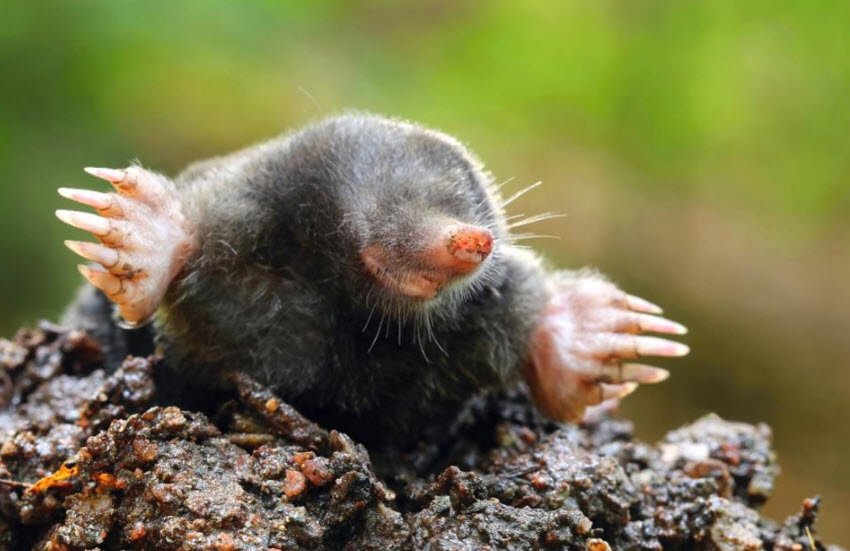How To Get Rid Of Moles?

Moles are solitary, insect-eating creatures who live underground and only come to the surface to find a mate. They dig a network of underground tunnels a foot deep into the soil with their front paws.
Moles do not cause significant damage in their natural environment or large, open rural areas. They only become a problem when they make their way into your lawn and garden. Moles aerate the soil naturally and eat the larvae of pests. They will, however, destroy plant roots, bulbs, and grass in your yard. The presence of small, volcano-shaped mounds and raised ridges of dirt in your yard is the telltale sign of a mole infestation, not the presence of the mole itself.
Learn More: Wild Mole Removal Common Questions
How To Remove Moles From A Lawn?
The wildlife removal market is filled with at-home “solutions” for mole removal, but these products are not effective for long-term removal. Repellents, grub treatments, and planting specific items may help keep a mole away from a specific area, but they will not eliminate the mole. The mole will just relocate to a different part of a lawn and continue its path of destruction.
The best way to remove moles is to hire a pest control expert to trap the animals because a pest control expert will know for a fact that the moles have been captured and relocated. Extermination practices are less effective because it’s impossible to know if all of the moles have been killed. Trapping techniques are recommended because you can see how many moles were on the property and ensures that they are relocated. Mole trapping, mole removal, and mole control are all things that can be performed by Animals Happen to completely eradicate moles from a lawn.
Do Mole Poisons Work?
There are numerous mole poisons on the market. Several companies have attempted to develop mole poisons, but none appear to be effective. In most cases, only trapping will suffice. There are “poison peanuts,” “poison gummy worms,” “poison seeds,” and a variety of other poisons. Yes, it is a poisonous substance, but the issue is that it will never work actually to kill moles because they will never eat poison. Only live earthworms and grubs, as well as a few insects, are eaten by moles. Poisons for moles are a waste of time.
What Would Happen If You Let The Moles Live In Your Yard?
Moles are attracted to food sources, and homes with rich soil or gardens are the perfect spot for a mole family to gather. As these creatures search for food, they will continue building deep tunnels and uprooting plants or bushes. If left alone, moles will completely destroy a lawn, leaving behind a path of destruction. Mole mounds will cover the surface of the yard and, if stepped on, may collapse. This makes it unsafe for people to walk around their property because it could end with an ankle injury.
It’s not easy to build a healthy garden, and an infestation of moles can completely wipe away the hard work you put in. Within a couple of days, a few moles will uproot all of the plants, resulting in the garden’s death. Small trees and bushes are also at risk. Larvae are the preferred food of moles, and they’re found on the roots of trees and bushes. To find food, the moles will destroy the roots and end up killing a small tree or bush.
In a worst-case scenario, moles can damage the foundation of a home. As they burrow closer to home, the displaced soil shifts the foundation. This results in cracks that will weaken the structure of a home. Similar to concrete foundations, sidewalks and walkways are susceptible to the same damage.
Who Can Remove Moles From My Lawn?
Any experienced wildlife removal technician will be trained to properly remove moles and take precautions to deter the pests from returning. The best way to find a capable removal company is to search reviews of the company and ask what their removal tactics are. A well-experienced company verified by Animals Happen will use proven trapping techniques rather than ineffective options such as poisons. If you have a mole problem, call us today before the infestation can grow any larger.
